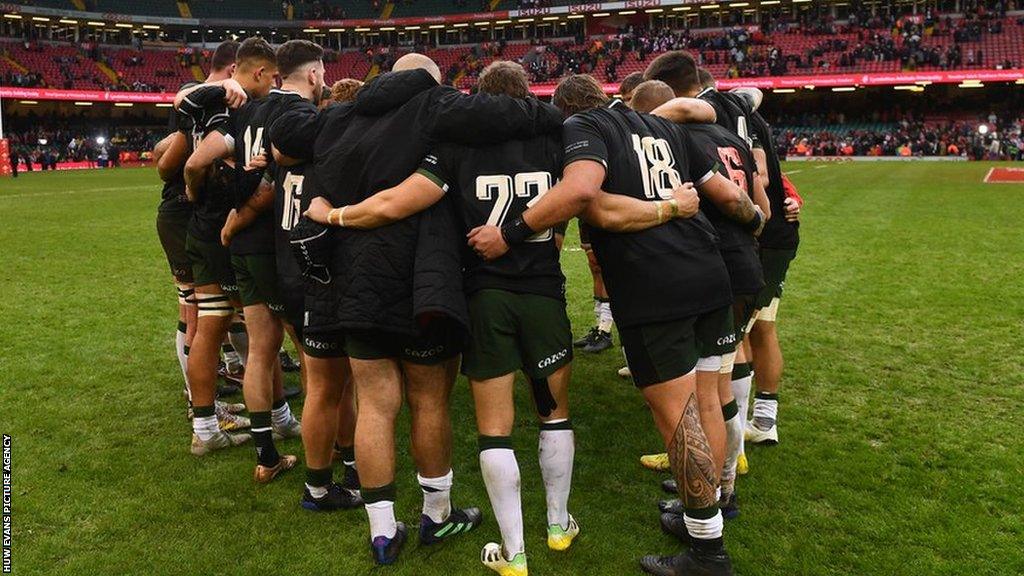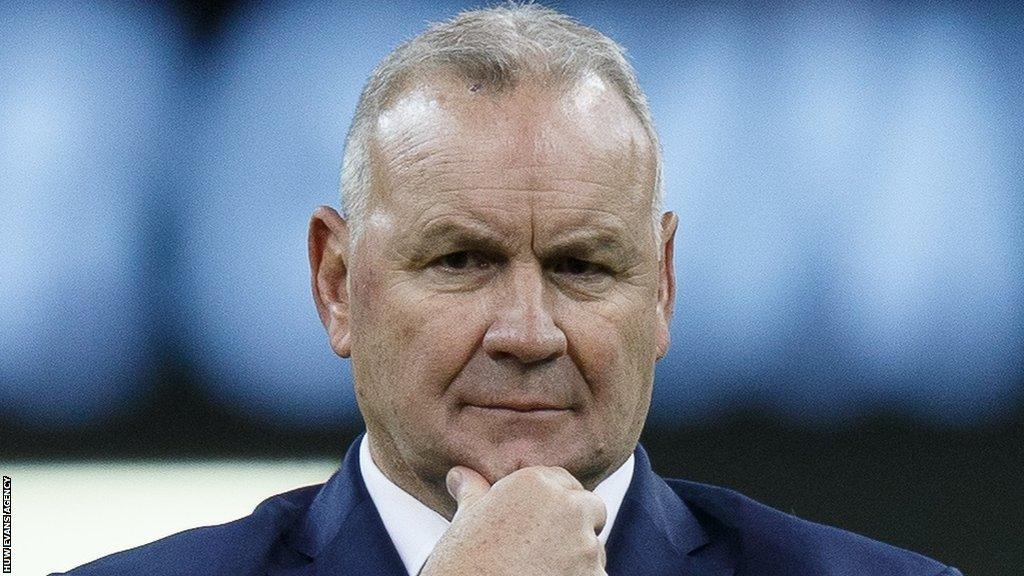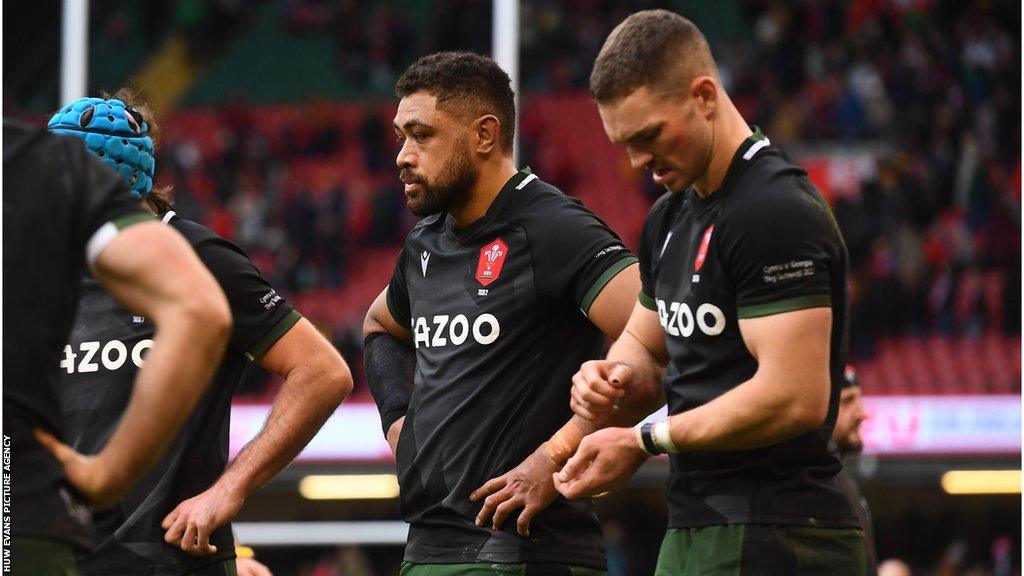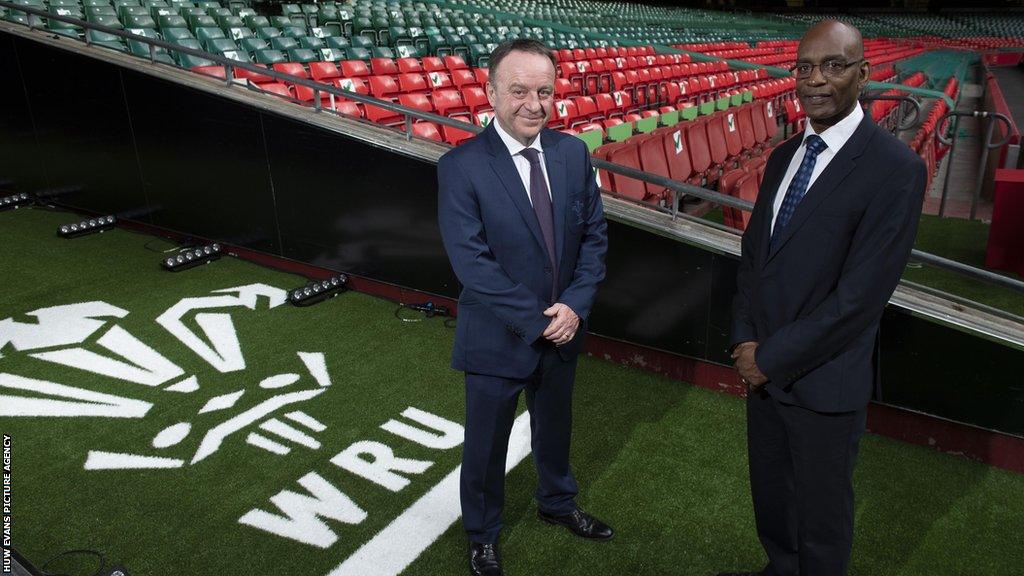Dark day for Wales as questions emerge over Wayne Pivac's future
- Published

Wales players in a huddle after the 13-12 defeat against Georgia
Autumn Nations Series: Wales v Australia |
|---|
Venue: Principality Stadium, Cardiff Date: Saturday, 26 November Kick-off:15:15 GMT |
Coverage: Commentary on BBC Radio Cymru and updates on BBC Radio Wales; live text commentary on BBC Sport website & app |
It was fitting that a dark day for Welsh rugby was matched by the black kit worn by Wayne Pivac's side against Georgia.
Wales never look right in any shirts that are not red. They were certainly off colour in Cardiff this weekend.
Former coach Warren Gatland said after leading Wales to fourth place in the World Cup in Japan in 2019: "I hope they (Wales) continue to build on what we have achieved in the last 12 years. It would break my heart if Wales went back into the doldrums."
For Romania in 1988, Western Samoa in 1991, Canada in 1993, Samoa in 2012, now read Georgia in 2022. Pivac's side added themselves to the history of humbling home defeats against tier two nations.
Of course, we have already had the embarrassment in March of a first loss to Italy in Cardiff.
Like the Azzurri eight months ago, the Georgians deserved the victory, a first away win over a tier one side.
The visitors put forward their case for a chance to bid for a Six Nations spot and deserved all the plaudits they received.
But they faced a shapeless and soulless Wales side, shorn of ideas and energy.
The Georgia defeat was a performance described as "inexcusable" by former Wales centre Jamie Roberts, with ex-captain Sam Warburton labelling the loss "unacceptable".
So where does that leave Wales and Pivac himself, less than 10 months and nine matches out from the World Cup opener against Fiji in Bordeaux?
Coach concern

Wayne Pivac succeeded fellow New Zealander Warren Gatland as Wales coach after the 2019 World Cup
After the damaging defeat, #pivacout was trending on social media. It was undeniably the most inept performance of Pivac's three-year reign so far.
It leaves Welsh Rugby Union chief executive Steve Phillips and performance director Nigel Walker with a significant question to answer ahead of Australia arriving in Cardiff next weekend.
If Wales lose at home to Georgia, Pivac knows questions will be asked about his position. If he does not, he should. He has lived in Wales long enough.
Especially when the lamentable loss came just months after the Italy debacle in the Six Nations finale.
Wales have won just three of their 11 games this year with victories over Scotland, South Africa and Argentina.
The first historic win over Springboks in South Africa by a Wales side in July in Bloemfontein and that 2021 Six Nations success seem distant memories now.
Since taking over from Gatland after the 2019 World Cup, Pivac's overall international record is 13 victories, 19 defeats and a draw. His win ratio against sides ranked in the top 10 in the world is less than 30%.
The argument against instigating change now is Wales are less than a year out from the World Cup and the introduction of a fresh coaching team would not be ideal preparation.
But Pivac knows he cannot afford to have any more days like the Georgian loss.
Lack of player power
One of the main concerns highlighted by Warburton and Roberts was players not having desire against Georgia.
Wales' physical power had been questioned after the 55-23 hammering by New Zealand, but Pivac's side bounced back with a 20-13 win against Argentina.
Wales had made only six changes and included British and Irish Lions like Ken Owens, Adam Beard, Justin Tipuric, George North, Louis Rees-Zammit, Josh Adams and Alex Cuthbert in the starting side.

George North and Taulupe Faletau are both dejected after the final whistle against Georgia
Following two tries from flanker Jac Morgan which helped build up a 12-3 lead, Wales failed to score again after the 24th minute.
In truth, some bright sparks from Tomos Williams and Adams aside, they rarely looked like adding to the tally.
Georgia grew in confidence, they were more powerful and dominant and deserved the victory. Worryingly, they were fitter and looked like they wanted it more.
The fight and character demonstrated in South Africa by Pivac's charges was conspicuous by its absence.
That attitude was led by captain Dan Biggar and how Wales have missed the spirit of the injured fly-half during this campaign.
Blunt attack
Since Wales won the 2021 Six Nations title with a record 20 tries, the attack under Stephen Jones has become blunt.
Wales have scored two tries in each game against New Zealand, Argentina and Georgia but have lacked a clinical edge when arriving into the opposition 22.
They also appeared to lose shape after the initial first phase of attacks with players looking like they were unsure what to do next against Georgia.
The first half saw dangerous runners like Cuthbert and Rees-Zammit kick the ball away while Wales were on the offensive.
The second half witnessed Wales resorting to fly-half Rhys Priestland kicking the ball in the air when Georgia were dominating the aerial contest, with Cuthbert being shown a crucial yellow card after one high ball battle.
Tactically and technically, Wales looked all at sea. Without a life jacket in sight.
Structural issues
This result has been coming for a long time. It cannot just be put down to Pivac and his coaches and players.
Welsh rugby is in a mess from the top down. The regions have struggled consistently over the last decade.
The success of the national side with Grand Slams and World Cup semi-finals over the last decade has often papered over the cracks that are now being exposed.
While Phillips and Walker have a decision to make about the future of the coaching staff, they have to look at themselves. Also trending on Twitter on Saturday night was "The WRU". And they were not messages of congratulations.

Welsh Rugby Union chief executive Steve Phillips appointed performance director Nigel Walker in 2021
There is yet more in-fighting between the WRU and regions over a long-term financial deal which has yet to be resolved.
It means currently there is a player recruitment freeze for next season with the four professional sides not knowing their budgets.
That is not the way to run the professional game in Wales but the WRU, always billed as a union of clubs, is battling to ensure the business is an effective 21st century organisation.
That was typified by the recent vote at a WRU annual general meeting where the clubs stopped the governing body from passing a motion that would have allowed them to appoint an independent chair to run a business with a £100m turnover.
Warburton's blunt assessment summed up the situation neatly.
"The problems are way deeper," said Warburton.
"It was in the press a couple of weeks ago - the governance and the WRU.
"There are people there with best intentions who have been brilliant in supporting the community game and should definitely have a place.
"But it shouldn't have a place in deciding what happens to a £100 million turnover company.
"We are trying to win a World Cup. It's an old structure that's been in place for a long time that doesn't suit modern rugby. That has to change.
"All good organisations start at the top. We can look at the pitch but we need to look way beyond that because the problems are much deeper.
"The cracks have been there for a long time and are now finally coming to fruition. That's the harsh truth."
A coherent strategy is required because interest in the Wales team is still there.
The November games have attracted crowds of around 60,000 for Georgia and Argentina after just under 73,000 attended the New Zealand mauling.
If those supporters witness many more shambolic efforts like last Saturday, it remains to be seen whether that interest wanes.
As Wales' football team prepare for a first World Cup in 64 years, the rugby team are in disarray ahead of its own next global tournament. The contrast is stark.
Australia await
The Wallabies will be in town on Saturday after a narrow defeat against world number one side Ireland in Dublin.
It is a match occurring when all four Welsh sides are in South Africa playing in the United Rugby Championship, shorn of their top stars.
Just another indication of the issues Wales professional players and sides face.
Pivac will also be without England-based players Rees-Zammit, Nick Tompkins, Tommy Reffell, Christ Tshiunza and Dafydd Jenkins because the match is being played outside World Rugby's international window.
Like Georgia, Wales face Australia in the World Cup pool in France next year with Fiji and Portugal also involved.
Pivac will have always believed the game on 24 September, 2023, in Lyon would be Wales' most important match against Australia during his reign.
Now it could instead be the Wallabies match on 26 November, 2022 at the Principality Stadium in Cardiff that proves pivotal.
Success is required to try and ensure this Wales coach realises his dream of leading his adopted nation into the global tournament.